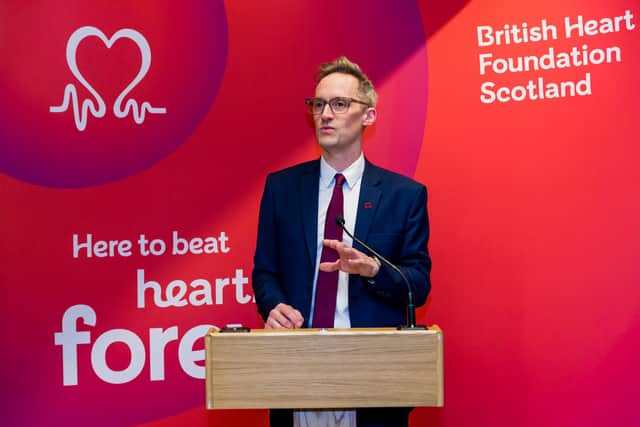Six decades of research progress at risk of slowing over pandemic funding cuts, warns charity
Scotland head James Jopling said he is “really proud” of the progress made by BHF ahead of the charity’s 60th anniversary on July 28, but is now concerned for the future.
It comes as charities across research sectors warn of similar risks.
Advertisement
Hide AdAdvertisement
Hide AdWith charity shops closed, sponsored events cancelled and community fundraising activities limited, BHF saw income plummet last year, and as a result halved its investment into new research at a loss of about £50 million pounds.


“BHF is the single biggest funder of research into cardiovascular disease in the UK, so when we suffer those kinds of losses, they run the risk of slowing progress of the kind of discoveries which has made such a difference in the last 60 years,” said Mr Jopling.
“We run the risk of losing bright young minds to science and cardiovascular research in particular because of the challenges we face in funding the work we would love to fund.”
Cancer Research UK said there is “no doubt” that Covid-19 limited the charity’s ability to fund research.
“This has slowed down progress towards those crucial discoveries that will ultimately lead to better treatments for cancer,” a spokesperson said, adding that more cuts will be needed in the next five years without extra support.


And David Thomas, head of policy at Alzheimer’s Research UK, said “critical progress” is at risk.
"Covid-19 has caused huge disruption to dementia research across the UK, with projects delayed and a lack of funding opportunities across the board forcing many scientists to consider leaving the field altogether,” he said.
According to the BHF, In the 1950s around eight out of ten babies diagnosed with a complex congenital heart condition in the UK died before their first birthday, while now, thanks to research discoveries, more than eight out of ten reach adulthood.


Advertisement
Hide AdAdvertisement
Hide Ad“This shift we've seen in a relatively short period of time is substantial, we've seen a halving in the deaths of people from heart conditions in Scotland in that time,” said Mr Jopling.
“Yet still heart disease remains Scotland's biggest killer.
“So we're really proud of the progress we've made, which is solely down to people's contributions to us financially by buying things in our shops, but we remain concerned about that potential slowing of progress, about us being able to stay at the forefront of new medical discovery, with all that technology and data offer us in terms of our understanding of individuals and patients.”
He added: “We see now around 50 deaths a day in Scotland from heart and circulatory diseases.


“And that will happen tomorrow and the next day, and progress will continue. But that's not an acceptable figure.
“That's not an acceptable impact on families across Scotland, and somehow we need to find a way to make sure that people with those conditions and preventing those conditions is given the priority it needs.”
Charity shops, a “massive” source of funding for the BHF, have now reopened, and initial sales have been “encouraging”, Mr Jopling said.
But there are still challenges - shops are seeing the same issues around staff self-isolation as everywhere else, and not all volunteers feel comfortable returning yet.
Sponsored events have largely not re-started, and community fundraising, such as smaller events like bake sales, is still disrupted.
Advertisement
Hide AdAdvertisement
Hide AdIt is too early to tell what the long-term impact on the BHF will be and what kind of funding cut the charity will face this year, Mr Jopling said.
Dr Michelle Williams, a senior clinical research fellow at the BHF Centre for Cardiovascular Science at Edinburgh University, said everything about getting research funding is “more challenging now”.
“That definitely has the potential to have a big impact on what we can do from a research point of view if things don't pick up,” she said.
She added: “We've made an immense impact in the past 60 years.
“We can see the number of people coming to hospital with heart attacks has gone down, the number of people dying with heart attacks has gone down, the treatments that we have to prevent or treat heart attacks are all improving, but we’re only just getting started.
“60 years is not a long time in the history of human beings, and so we've got a huge amount of work still to do, and there are vast, vast gains that can be made.”
Dr Shruti Joshi, a BHF-funded PhD researcher also at Edinburgh University, is “really concerned” about funding cuts as a result of the pandemic.
Her research investigates why people with type two diabetes are two and a half times more likely to develop heart failure.
Advertisement
Hide AdAdvertisement
Hide Ad“If we were to come up with specific pathways and target those pathways with specific treatments, then we could prevent people with diabetes from developing heart failure,” she said.
“I think there are so many unsolved questions, like why is there a difference between heart failure amongst men and women? Men get more heart failure compared to women, is this the same that we see in the type two diabetes cohort as well? We actually don't know. So, there’s a lot to do still.”
She added: “Even in the last five years or so we have had two new breakthrough treatments for heart failure, which have increased chances of survival after being diagnosed with it.
“I think there’s definitely scope to do a lot more - specifically, people with diabetes developing all these conditions, and gender and ethnic differences.
“Why are Asians more likely to have heart disease or heart failure or type two diabetes? “There are so many unanswered questions I think, so if we had more funding for research into this, it could be absolutely life changing.”
A message from the Editor:
Thank you for reading this article. We're more reliant on your support than ever as the shift in consumer habits brought about by coronavirus impacts our advertisers.
If you haven't already, please consider supporting our trusted, fact-checked journalism by taking out a digital subscription.
Comments
Want to join the conversation? Please or to comment on this article.
